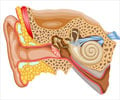A new study has suggested that kids with a history of severe ear infections are at an increased risk of becoming overweight later in life.
Kids with a history of severe ear infections are at an increased risk of becoming overweight later in life, says a new study.
The study found that the damage caused by chronic ear infections could be linked to people's preference for fatty foods, which increases their risk of being overweight as they age."Middle ear infection is a common childhood disease and obesity is a growing problem worldwide. Any potential association between these two public health issues is of considerable interest," said Linda Bartoshuk, PhD, of the University of Florida College of Dentistry.
Bartoshuk analyzed some previous studies that show a strong link between localized taste damage from chronic middle ear infections, or otitis media, and an increased preference for high-fat foods.
In one study, 6,584 people who attended a lecture series responded to a series of health questions that determined their history of middle ear infections and their body mass index (BMI). The participants, mostly academics, were between 16 and 92 years old.
The findings showed that those with a moderate to severe history of otitis media were 62 percent more likely to be obese.
John Hayes, PhD, of Brown University and his colleagues at the University of Connecticut, found link between otitis media exposure, taste, food choice and obesity.
Advertisement
In another study, they found preschoolers with a severe history of ear infections ate fewer vegetables and more sweets and tended to be heavier.
Advertisement
Scientists are also looking at the possibility that damage to other taste nerves may also be linked to weight gain.
Having the tonsils removed also appears to have an effect on whether a child will be overweight.
Epidemiologist Howard Hoffman, MA, in a re-examination of the National Health Examination survey, which was conducted in the 1960s, found that 13,887 children ages 6 to 17 who had had their tonsils removed were at an increased risk for being overweight.
The recent analysis showed younger children, ages 6 to 11, who had had tonsillectomies were 40 percent more likely to be overweight at the time of the survey.
Another finding was that teen girls who had had their tonsils removed were 30 percent more likely to be overweight.
Hoffman said tonsillectomies were a common treatment for chronic ear infections during the period of this survey.
"This data suggests that there are lingering effects of tonsillectomies on taste nerves and that can affect eating habits," said Hoffman.
The study was presented at the American Psychological Association's 116th Annual Convention.
Source-ANI
RAS/L















